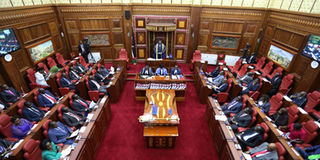Do not beg for the centre but make counties centres of wealth creation

The Senate in session. FILE PHOTO |
What you need to know:
- The proposed system tweaks the revenue-sharing formula by giving more weight to a county’s population at the expense of land mass.
- If governors exercised their minds on economic growth policies, the kind of push and pull being witnessed would be a thing of the past.
The proposed revenue sharing formula has exposed chinks in the national fabric that transcend the regular ethnic-political divides.
The excuse for a ruling party, Jubilee, is divided down the middle on fault lines that have nothing to do with the ‘new normal’ power-plays pitting President Uhuru Kenyatta against Deputy President William Ruto. Neither the former’s Kieleweke faction nor the latter’s Tangatanga squad has a clear position, with Senators taking sides based on their ethnic or regional interests rather than the allegiance to any factional or party policy.
None of the main opposition formations in the dying Nasa coalition or its constituent parties — Raila Odinga’s ODM, Kalonzo Musyoka’s Wiper, Musalia Mudavadi’s ANC and Moses Wetang’ula’s Ford-Kenya — have any clear position either.
And the rift also threatens the emerging alliance fronted by President Kenyatta and Mr Odinga, with a rather over-excited Jubilee Majority Leader Irungu Kangata threatening to scuttle the Building Bridges Initiative if ODM does not toe the Jubilee line on the revenue formula.
AGE-OLD DIVISIONS
He will find that he is way out of his depth, but that will be inconsequential in the midst of a feud that revives the age-old divisions between the haves and have-nots.
The proposed system tweaks the revenue-sharing formula by giving more weight to a county’s population at the expense of land mass. This means the small but densely populated counties get more while large and sparsely populated ones get less.
It just so happens that the formula favours the relatively wealthier and more developed counties in central Kenya, Rift Valley, western and Nyanza regions while traditionally neglected, marginalised and underdeveloped northern and northeastern Kenya lose out.
The feud first played out over the demarcation of constituency boundaries has re-emerged on the revenue sharing formula and provides a major headache for President Kenyatta, who already has more on his plate than he can handle.
More important than the President’s headache and the potential political quagmire is that the rift exposes a major fault in our devolution architecture. A fact few want to acknowledge and address is that we adopted a devolution system where counties forever have their begging bowls at the National Treasury rather than working towards economic independence and sustainable governments.
SELF-RELIANT
Instead of stressing on our brains on revenue sharing formulae that will never satisfy everyone, we should tear the entire blueprint to pieces and work on an entirely new system that does not have counties waiting for hand-outs from the centre.
We need a system where all counties are self-reliant. They must pay their governors and other elected leaders, and all public servants, from revenues generated internally. They must also fund their own social and economic development from internal resources. Simply put, a county government that cannot pay for itself cannot justify its existence.
Perhaps, this is the shock therapy counties need to turn from beggars to creators of wealth. One can today traverse Kenya from south to north and east to west and not set foot in a county with clear, focussed economic development roadmaps.
I am yet to see a county with clear plans to entice direct investments in agriculture, manufacturing, tourism, mining and infrastructure development. Instead of providing incentives for investors — such as land grants, tax holidays, roads, water, power and so on — our county governments are busier chasing them away with insatiable demands.
One can hardly start an enterprise anywhere in Kenya without being hit by red tape and demands for all manner of rates and levies — and bribes.
If governors exercised their minds on economic growth policies, the kind of push and pull being witnessed would be a thing of the past.
That is not a task for the lazy, slow and dull. Perhaps the job would attract the hard-working and imaginative visionaries if self-reliance and economic emancipation became pre-requisite for any county leadership.
It will follow, however, that self-reliance will include countries being allowed to keep their own wealth. It makes nonsense of devolution, for instance, that the proceeds of titanium mining in Kwale hardly benefit the local people. Opaque, secretive, unjust and corrupt agreements signed by denizens of the national government deny the people of Kwale their birthright; as do similar arrangements on gemstone mining in Taita-Taveta, oil in Turkana and other natural resources exploited elsewhere which leaves crumbs for the locals.
Governors should demand a fair share — for their people, not themselves — before holding out the begging bowls.
[email protected] www. gaitho.co.ke @MachariaGaitho





